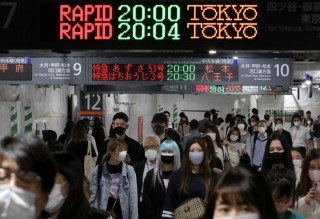Loading
Search
▼ Some COVID-19 Measures May Remain Even After Japan Lifts Emergency
- Category:Other
The top government spokesman said Saturday some restrictive measures against the coronavirus could be kept in place even if the COVID-19 state of emergency in Tokyo, Osaka and eight other prefectures is lifted as scheduled on June 20.
The government may scale down the state of emergency to quasi-emergency measures, which allow local authorities to impose restrictions such as requesting eateries to close early, Chief Cabinet Secretary Katsunobu Kato said on a TV program.
His remarks came a day after the government extended by three weeks the emergency declaration for nine prefectures and quasi-emergency steps in five other prefectures to June 20, just over a month before the Olympics begin in the capital. In Okinawa, the state of emergency was already due to remain in force until that date.
“The important thing is how to curb the spread of the virus effectively,” Kato said, adding that the government will need to consider ways of improving the infection situation, including through quasi-emergency measures, even after the end of the state of emergency.
On the same TV program, Satoshi Kamayachi, an executive board member of the Japan Medical Association who also serves on a government advisory panel on COVID-19, said the panel wants to confirm a clear downward trend in the infection situation before considering lifting the state of emergency.
Japan is grappling with a fourth wave of coronavirus infections triggered by a surge in highly contagious variants, putting severe pressure on health care services already strained by the prolonged pandemic.
Prefectural governors decided in a meeting Saturday to urge Prime Minister Yoshihide Suga’s government to step up testing capabilities for the highly contagious variant first detected in India.
In a set of proposals soon to be submitted to the government, the National Governors’ Association is also set to ask for detailed schedules for COVID-19 vaccine distribution to municipalities in order to start inoculating people with underlying health conditions in a swift manner after shots are completed for older people.
The country lags far behind other developed countries in the vaccine rollout. Suga has vowed to finish inoculating older people by the end of July.
The vaccination program started in February with health care workers and was later expanded to people aged 65 or over, but only about 6% of the nation’s residents have received at least one dose.
In the online meeting, many governors voiced concerns over a lack of medical workers who are able to administer COVID-19 vaccines.
The government may scale down the state of emergency to quasi-emergency measures, which allow local authorities to impose restrictions such as requesting eateries to close early, Chief Cabinet Secretary Katsunobu Kato said on a TV program.
His remarks came a day after the government extended by three weeks the emergency declaration for nine prefectures and quasi-emergency steps in five other prefectures to June 20, just over a month before the Olympics begin in the capital. In Okinawa, the state of emergency was already due to remain in force until that date.
“The important thing is how to curb the spread of the virus effectively,” Kato said, adding that the government will need to consider ways of improving the infection situation, including through quasi-emergency measures, even after the end of the state of emergency.
On the same TV program, Satoshi Kamayachi, an executive board member of the Japan Medical Association who also serves on a government advisory panel on COVID-19, said the panel wants to confirm a clear downward trend in the infection situation before considering lifting the state of emergency.
Japan is grappling with a fourth wave of coronavirus infections triggered by a surge in highly contagious variants, putting severe pressure on health care services already strained by the prolonged pandemic.
Prefectural governors decided in a meeting Saturday to urge Prime Minister Yoshihide Suga’s government to step up testing capabilities for the highly contagious variant first detected in India.
In a set of proposals soon to be submitted to the government, the National Governors’ Association is also set to ask for detailed schedules for COVID-19 vaccine distribution to municipalities in order to start inoculating people with underlying health conditions in a swift manner after shots are completed for older people.
The country lags far behind other developed countries in the vaccine rollout. Suga has vowed to finish inoculating older people by the end of July.
The vaccination program started in February with health care workers and was later expanded to people aged 65 or over, but only about 6% of the nation’s residents have received at least one dose.
In the online meeting, many governors voiced concerns over a lack of medical workers who are able to administer COVID-19 vaccines.
- May 29, 2021
- Comment (0)
- Trackback(0)


